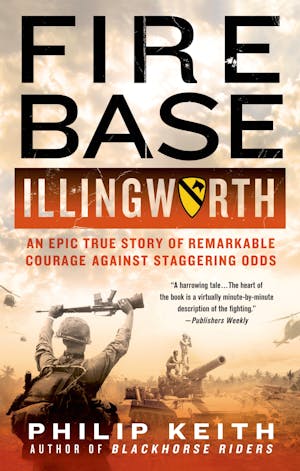1
THE TRAP IS BAITED
It was quiet, but it wouldn't be for long. Lt. Col. Mike Conrad, commanding officer of the 2/8, and the senior officer commanding at FSB Illingworth, knew the NVA were out there. His ground surveillance radar had found them stacked up and swarming in the tree line, and they would come boiling out of the jungle and attempt to overrun his undermanned and vulnerable position as soon as they felt ready. That would be just about any moment. He knew he'd get a warning, though—maybe a few minutes—before the assault began. The NVA were experienced, tough, capable, and far from stupid. They'd begin by pounding the bejesus out of Conrad's base with mortars, rockets, recoilless rifles, and whatever artillery they might have been able to drag through the woods and place behind their front lines. They would soften up the Americans before blowing their bugles and charging Conrad's works.
It was 0217, April 1, 1970. Every man on the fire base, about 220 of them, had been woken up in anticipation of an attack. Conrad had demanded that every officer and every sergeant make sure that every man was awake and alert. The "Pipsy-5"1 antipersonnel radar that Conrad and his men had deployed to scour their perimeter had initially picked up strong movement right before midnight, especially in the jungle area facing the southwest corner of their pitifully small berm. Conrad did not hesitate. He ordered the Cobra gunships he had standing by to zoom in and rake the tree lines. They unloaded salvo after salvo of rockets and ripped the foliage with their miniguns. Artillery from nearby firebases like FSB Hannas, FSB St. Barbara, and Camp Hazard opened up on the preprogrammed coordinates they had carefully calculated, aiming points designed to support FSB Illingworth. Conrad also unleashed his own .50 cal machine guns and whatever M-60s were available, and all guns poured fire directly into the trees ahead.
No response came back toward Conrad's lines, however, and after a few minutes, the firing of the defenders slowed to a stop. Rotor blades flicked away in the night sky, their sounds becoming faint as they sped away to refuel and resupply. The throaty cannons and mortars fell silent, too. Machine-gun barrels glowed, and the smell of warm gun oil wafted on the night air. The grunts put their personal weapons back on "safe." It became eerily quiet. After a few minutes the night sounds returned. Crickets recommenced their chirping; a monkey screeched in the trees. Within the lines, the men nervously began the never-ending process of wiping down and reloading their weapons. They relaxed—as much as they could given the tension swirling around them. A number of them decided to catch a few z's. Those who could sleep did so in place, boots on, heads resting on helmets or other equally uncomfortable, makeshift pillows.
Colonel Conrad cautiously stepped out from his TOC (tactical operations center) and peered into the blackness. With his RTO (radio telephone operator) at his side he decided to walk the perimeter—again. It would be one more sweep of the interior lines, just to be sure that he and his men had done everything humanly possible to be ready.
A thousand things were racing through Conrad's brain. Uppermost in his thoughts was the fact that as bad as their situation had become, it was exactly what his bosses had wanted it to be. His men were being used as lures, very expensive and vulnerable lures, to draw out the NVA and get them to expose themselves. It had worked, that was for sure, and since it had, Conrad's job had morphed into keeping the lures from being swallowed whole. It wasn't going to be easy.
After his last stroll Conrad returned to the TOC. He decided to lie down and try to catch a few precious moments of sleep. He would not get very much rest. About an hour later, after tossing around miserably on his cot, he was wide awake. At 0217, somewhere out in the inky blackness, he heard them: faint whistles followed by the barking of artillery. Conrad leapt from his rack and tried to race outside. Bad move—he was forced to dive back into the TOC as sheets of steel rained down on his post. The explosions ripped the night sky apart and enveloped the entire compound in deadly shards of red-hot metal.
Copyright © 2013 by Philip Keith





